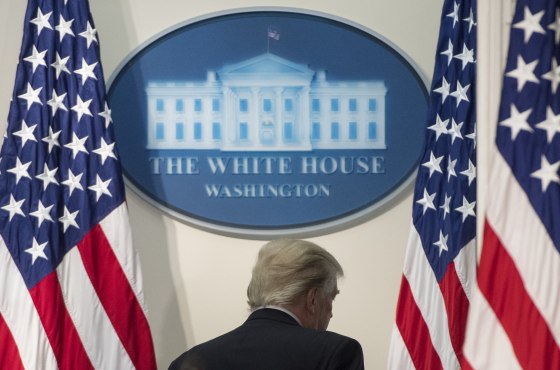As the controversy builds over Donald Trump's choice of Rep. John Ratcliffe (R-Texas) to serve as the director of national intelligence, Time magazine published a discouraging report this morning:
In a sign of how dysfunctional President Trump's relationship with the intelligence community has become already, some senior spies and analysts say having a political ally as DNI may not make much of a difference at this point.Trump, these senior officials point out, pays only sporadic attention to his daily briefings, routinely ignores analysis that contradicts his own views, and in many cases pursues policies that analysts have concluded are fruitless or misguided.
This, in a rather twisted way, is intended to suggest Ratcliffe wouldn't be all that important, at least when advising the president on matters related to intelligence and national security. Why? Because Trump makes his own assumptions and doesn't much care what his own country's intelligence community has to say.
Alas, this is very easy to believe. Circling back to our earlier coverage, the president sat down with CBS News' Margaret Brennan in February, and the host asked if he's prepared to “trust the intelligence” he receives from his own national security team. In a normal administration, the question might’ve seemed bizarre. In this president’s administration, no one could be sure of the answer.
Trump said in response, “I am going to trust the intelligence that I’m putting there.” I still haven’t the foggiest idea what that was supposed to mean.
Soon after, in the same interview, the host noted that the administration’s intelligence chiefs have concluded that Iran is abiding by the terms of the international nuclear agreement. “I disagree with them,” Trump replied, indifferent to the fact that his team’s assessment was based on facts, and his disagreement was based on his preferred version of reality.
The Republican went on to argue, “I have intel people, but that doesn’t mean I have to agree. President Bush had intel people that said Saddam Hussein in Iraq had nuclear weapons, had all sorts of weapons of mass destruction. Guess what? Those intel people didn’t know what the hell they were doing, and they got us tied up in a war that we should have never been in.”
Trump, however, learned the wrong lesson from George W. Bush’s presidency. To the current president, Iraq offers proof that American intelligence professionals are unreliable. In reality, Iraq offers proof of what happens when a White House pressures intelligence agencies to produce results intended to bolster preconceived ideas and political agendas.
Or put another way, what went wrong in the Bush/Cheney era is eerily similar to what’s happening now.
Time magazine published a related report around the same time.
In the wake of President Donald Trump’s renewed attacks on the U.S. intelligence community this week, senior intelligence briefers are breaking two years of silence to warn that the President is endangering American security with what they say is a stubborn disregard for their assessments.Citing multiple in-person episodes, these intelligence officials say Trump displays what one called “willful ignorance” when presented with analyses generated by America’s $81 billion-a-year intelligence services. The officials, who include analysts who prepare Trump’s briefs and the briefers themselves, describe futile attempts to keep his attention by using visual aids, confining some briefing points to two or three sentences, and repeating his name and title as frequently as possible.
The same article added that the Republican reacts angrily when presented with information that “contradicts positions he has taken or beliefs he holds.”
In some cases, American intelligence professionals have been warned not to provide Trump with intelligence assessments that “contradict stances he has taken in public.”
There is no scenario in which U.S. national security benefits from a policy dynamic like this. We appear to have an American president who simply chooses not to believe what his own intelligence agencies tell him and discourages intelligence professionals from providing him with information that challenges his preconceived ideas.
All of this is entirely consistent with similar leaks from officials who are probably desperate for some kind of rescue. The Washington Post reported late last year that U.S. intelligence analysts “frequently see troubling gaps between the president’s public statements and the facts laid out for him in daily briefings on world events.”
The CIA and other agencies have devoted enormous “time, energy and resources” to ensuring that accurate intelligence is delivered to Trump, an official told the Post, but his imperviousness to such material often renders “all of that a waste.”
Intelligence professionals keep going out of their way to accommodate Trump’s unique limitations – they’d dumbed down the briefings, removed details, prioritized “eye-catching graphics,” etc. – only to find an incurious president who doesn’t want to listen.
All of this reinforces the need for a capable and credible director of national intelligence. Trump is choosing to go in the opposite direction.
